Routage d’emails entrants
Configurez de l’Inbound email pour recevoir vos emails entrants et les intégrer dans votre application pour automatiser vos workflows
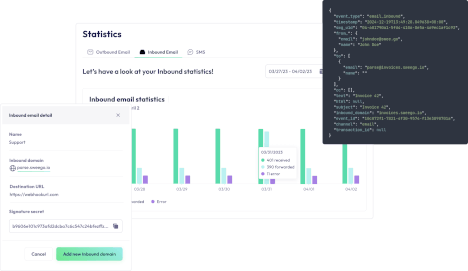
Automatisez, analysez et acheminez facilement vos emails entrants
Mettez en place des communications bidirectionnelles par email directement dans vos applications
Créez des conversations avec vos utilisateurs
Permettez à vos utilisateurs de vous répondre ou simplement d’envoyer des emails à votre app via JSON.
Utilisez n’importe quelle adresse, notre Catchall s’occupera du reste
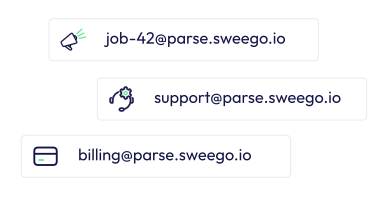
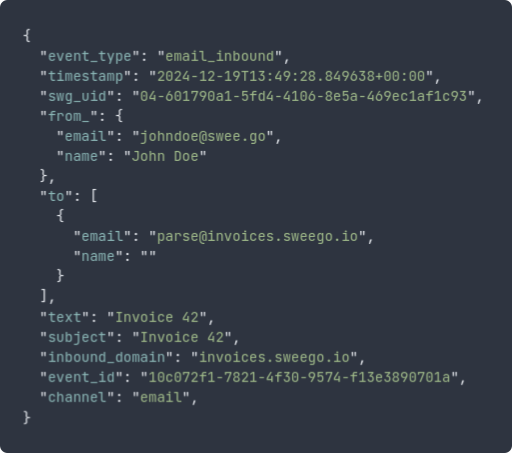
Vos emails en JSON
Parser soi-même des emails peut s’avérer complexe et chronophage… Nous analysons pour vous tous vos emails entrants sur votre domaine Inbound email et vous les envoyons via webhook au format JSON.
Logs détaillés
- Logs en temps réel
- Analysez en détail chacun des emails reçus et transmis via webhook
- Utilisez nos filtres pour analyser les événements en cours ou passés
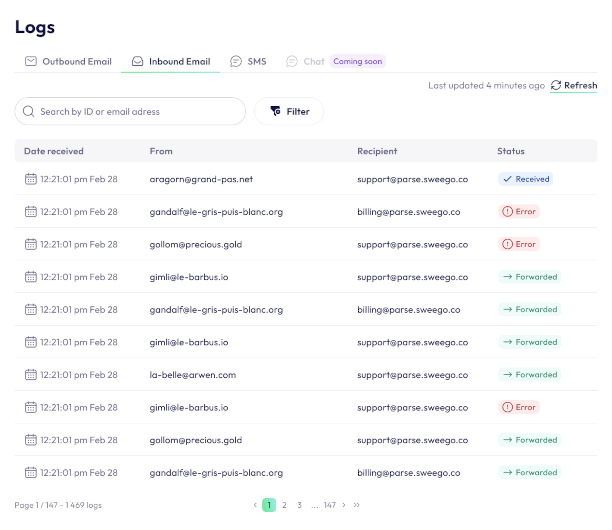
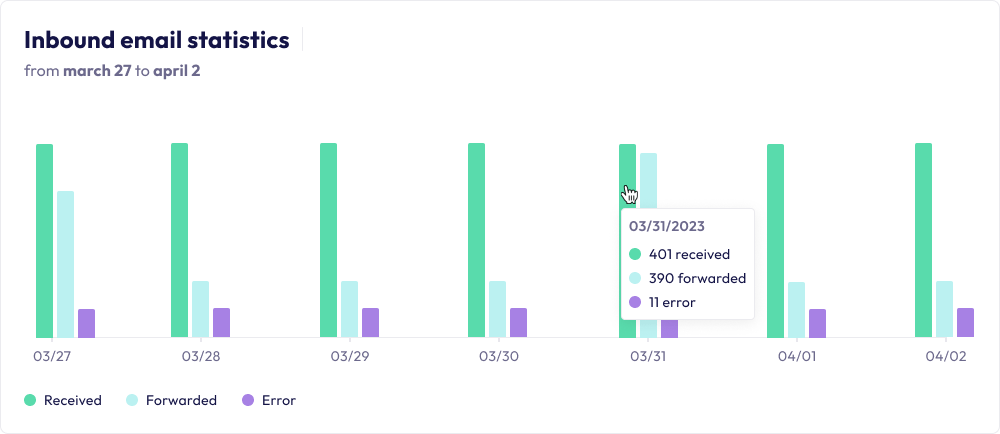
Statistiques de vos emails entrants
Pilotez le bon fonctionnement du routage de vos emails reçus.
Filtrez par domaine pour aller à l’essentiel et rechercher les boîtes mails utilisées en réception. Vous pouvez suivre en un coup d’œil les réponses sur les endpoints de vos webhooks
Python
import requests import json url = "https://api.sweego.io/clients/:uuid_client/domains/inbound" payload = json.dumps({ "name": "string", "webhook_url": "string", "subdomain": "string", "uuid_domain": "string" }) headers = { 'Content-Type': 'application/json', 'Accept': 'application/json', 'Authorization': 'Bearer <TOKEN>' } response = requests.request("POST", url, headers=headers, data=payload) print(response.text)<?php $curl = curl_init(); curl_setopt_array($curl, array( CURLOPT_URL => 'https://api.sweego.io/clients/:uuid_client/domains/inbound', CURLOPT_RETURNTRANSFER => true, CURLOPT_ENCODING => '', CURLOPT_MAXREDIRS => 10, CURLOPT_TIMEOUT => 0, CURLOPT_FOLLOWLOCATION => true, CURLOPT_HTTP_VERSION => CURL_HTTP_VERSION_1_1, CURLOPT_CUSTOMREQUEST => 'POST', CURLOPT_POSTFIELDS =>'{ "name": "string", "webhook_url": "string", "subdomain": "string", "uuid_domain": "string" }', CURLOPT_HTTPHEADER => array( 'Content-Type: application/json', 'Accept: application/json', 'Authorization: Bearer <TOKEN>' ), )); $response = curl_exec($curl); curl_close($curl); echo $response;package main import ( "fmt" "net/http" "io/ioutil" ) func main() { url := "https://api.sweego.io/clients/:uuid_client/domains/inbound" method := "GET" client := &http.Client { } req, err := http.NewRequest(method, url, nil) if err != nil { fmt.Println(err) return } req.Header.Add("Accept", "application/json") req.Header.Add("Authorization", "Bearer <TOKEN>") res, err := client.Do(req) if err != nil { fmt.Println(err) return } defer res.Body.Close() body, err := ioutil.ReadAll(res.Body) if err != nil { fmt.Println(err) return } fmt.Println(string(body)) }const https = require('follow-redirects').https; const fs = require('fs'); let options = { 'method': 'POST', 'hostname': 'api.sweego.io', 'path': '/clients/:uuid_client/domains/inbound', 'headers': { 'Content-Type': 'application/json', 'Accept': 'application/json', 'Authorization': 'Bearer <TOKEN>' }, 'maxRedirects': 20 }; const req = https.request(options, (res) => { let chunks = []; res.on("data", (chunk) => { chunks.push(chunk); }); res.on("end", (chunk) => { let body = Buffer.concat(chunks); console.log(body.toString()); }); res.on("error", (error) => { console.error(error); }); }); let postData = JSON.stringify({ "name": "string", "webhook_url": "string", "subdomain": "string", "uuid_domain": "string" }); req.write(postData); req.end();curl -L 'https://api.sweego.io/clients/:uuid_client/domains/inbound' \ -H 'Content-Type: application/json' \ -H 'Accept: application/json' \ -H 'Authorization: Bearer <TOKEN>' \ -d '{ "name": "string", "webhook_url": "string", "subdomain": "string", "uuid_domain": "string" }'PHP
import requests import json url = "https://api.sweego.io/clients/:uuid_client/domains/inbound" payload = json.dumps({ "name": "string", "webhook_url": "string", "subdomain": "string", "uuid_domain": "string" }) headers = { 'Content-Type': 'application/json', 'Accept': 'application/json', 'Authorization': 'Bearer <TOKEN>' } response = requests.request("POST", url, headers=headers, data=payload) print(response.text)<?php $curl = curl_init(); curl_setopt_array($curl, array( CURLOPT_URL => 'https://api.sweego.io/clients/:uuid_client/domains/inbound', CURLOPT_RETURNTRANSFER => true, CURLOPT_ENCODING => '', CURLOPT_MAXREDIRS => 10, CURLOPT_TIMEOUT => 0, CURLOPT_FOLLOWLOCATION => true, CURLOPT_HTTP_VERSION => CURL_HTTP_VERSION_1_1, CURLOPT_CUSTOMREQUEST => 'POST', CURLOPT_POSTFIELDS =>'{ "name": "string", "webhook_url": "string", "subdomain": "string", "uuid_domain": "string" }', CURLOPT_HTTPHEADER => array( 'Content-Type: application/json', 'Accept: application/json', 'Authorization: Bearer <TOKEN>' ), )); $response = curl_exec($curl); curl_close($curl); echo $response;package main import ( "fmt" "net/http" "io/ioutil" ) func main() { url := "https://api.sweego.io/clients/:uuid_client/domains/inbound" method := "GET" client := &http.Client { } req, err := http.NewRequest(method, url, nil) if err != nil { fmt.Println(err) return } req.Header.Add("Accept", "application/json") req.Header.Add("Authorization", "Bearer <TOKEN>") res, err := client.Do(req) if err != nil { fmt.Println(err) return } defer res.Body.Close() body, err := ioutil.ReadAll(res.Body) if err != nil { fmt.Println(err) return } fmt.Println(string(body)) }const https = require('follow-redirects').https; const fs = require('fs'); let options = { 'method': 'POST', 'hostname': 'api.sweego.io', 'path': '/clients/:uuid_client/domains/inbound', 'headers': { 'Content-Type': 'application/json', 'Accept': 'application/json', 'Authorization': 'Bearer <TOKEN>' }, 'maxRedirects': 20 }; const req = https.request(options, (res) => { let chunks = []; res.on("data", (chunk) => { chunks.push(chunk); }); res.on("end", (chunk) => { let body = Buffer.concat(chunks); console.log(body.toString()); }); res.on("error", (error) => { console.error(error); }); }); let postData = JSON.stringify({ "name": "string", "webhook_url": "string", "subdomain": "string", "uuid_domain": "string" }); req.write(postData); req.end();curl -L 'https://api.sweego.io/clients/:uuid_client/domains/inbound' \ -H 'Content-Type: application/json' \ -H 'Accept: application/json' \ -H 'Authorization: Bearer <TOKEN>' \ -d '{ "name": "string", "webhook_url": "string", "subdomain": "string", "uuid_domain": "string" }'Go
import requests import json url = "https://api.sweego.io/clients/:uuid_client/domains/inbound" payload = json.dumps({ "name": "string", "webhook_url": "string", "subdomain": "string", "uuid_domain": "string" }) headers = { 'Content-Type': 'application/json', 'Accept': 'application/json', 'Authorization': 'Bearer <TOKEN>' } response = requests.request("POST", url, headers=headers, data=payload) print(response.text)<?php $curl = curl_init(); curl_setopt_array($curl, array( CURLOPT_URL => 'https://api.sweego.io/clients/:uuid_client/domains/inbound', CURLOPT_RETURNTRANSFER => true, CURLOPT_ENCODING => '', CURLOPT_MAXREDIRS => 10, CURLOPT_TIMEOUT => 0, CURLOPT_FOLLOWLOCATION => true, CURLOPT_HTTP_VERSION => CURL_HTTP_VERSION_1_1, CURLOPT_CUSTOMREQUEST => 'POST', CURLOPT_POSTFIELDS =>'{ "name": "string", "webhook_url": "string", "subdomain": "string", "uuid_domain": "string" }', CURLOPT_HTTPHEADER => array( 'Content-Type: application/json', 'Accept: application/json', 'Authorization: Bearer <TOKEN>' ), )); $response = curl_exec($curl); curl_close($curl); echo $response;package main import ( "fmt" "net/http" "io/ioutil" ) func main() { url := "https://api.sweego.io/clients/:uuid_client/domains/inbound" method := "GET" client := &http.Client { } req, err := http.NewRequest(method, url, nil) if err != nil { fmt.Println(err) return } req.Header.Add("Accept", "application/json") req.Header.Add("Authorization", "Bearer <TOKEN>") res, err := client.Do(req) if err != nil { fmt.Println(err) return } defer res.Body.Close() body, err := ioutil.ReadAll(res.Body) if err != nil { fmt.Println(err) return } fmt.Println(string(body)) }const https = require('follow-redirects').https; const fs = require('fs'); let options = { 'method': 'POST', 'hostname': 'api.sweego.io', 'path': '/clients/:uuid_client/domains/inbound', 'headers': { 'Content-Type': 'application/json', 'Accept': 'application/json', 'Authorization': 'Bearer <TOKEN>' }, 'maxRedirects': 20 }; const req = https.request(options, (res) => { let chunks = []; res.on("data", (chunk) => { chunks.push(chunk); }); res.on("end", (chunk) => { let body = Buffer.concat(chunks); console.log(body.toString()); }); res.on("error", (error) => { console.error(error); }); }); let postData = JSON.stringify({ "name": "string", "webhook_url": "string", "subdomain": "string", "uuid_domain": "string" }); req.write(postData); req.end();curl -L 'https://api.sweego.io/clients/:uuid_client/domains/inbound' \ -H 'Content-Type: application/json' \ -H 'Accept: application/json' \ -H 'Authorization: Bearer <TOKEN>' \ -d '{ "name": "string", "webhook_url": "string", "subdomain": "string", "uuid_domain": "string" }'NodeJS
import requests import json url = "https://api.sweego.io/clients/:uuid_client/domains/inbound" payload = json.dumps({ "name": "string", "webhook_url": "string", "subdomain": "string", "uuid_domain": "string" }) headers = { 'Content-Type': 'application/json', 'Accept': 'application/json', 'Authorization': 'Bearer <TOKEN>' } response = requests.request("POST", url, headers=headers, data=payload) print(response.text)<?php $curl = curl_init(); curl_setopt_array($curl, array( CURLOPT_URL => 'https://api.sweego.io/clients/:uuid_client/domains/inbound', CURLOPT_RETURNTRANSFER => true, CURLOPT_ENCODING => '', CURLOPT_MAXREDIRS => 10, CURLOPT_TIMEOUT => 0, CURLOPT_FOLLOWLOCATION => true, CURLOPT_HTTP_VERSION => CURL_HTTP_VERSION_1_1, CURLOPT_CUSTOMREQUEST => 'POST', CURLOPT_POSTFIELDS =>'{ "name": "string", "webhook_url": "string", "subdomain": "string", "uuid_domain": "string" }', CURLOPT_HTTPHEADER => array( 'Content-Type: application/json', 'Accept: application/json', 'Authorization: Bearer <TOKEN>' ), )); $response = curl_exec($curl); curl_close($curl); echo $response;package main import ( "fmt" "net/http" "io/ioutil" ) func main() { url := "https://api.sweego.io/clients/:uuid_client/domains/inbound" method := "GET" client := &http.Client { } req, err := http.NewRequest(method, url, nil) if err != nil { fmt.Println(err) return } req.Header.Add("Accept", "application/json") req.Header.Add("Authorization", "Bearer <TOKEN>") res, err := client.Do(req) if err != nil { fmt.Println(err) return } defer res.Body.Close() body, err := ioutil.ReadAll(res.Body) if err != nil { fmt.Println(err) return } fmt.Println(string(body)) }const https = require('follow-redirects').https; const fs = require('fs'); let options = { 'method': 'POST', 'hostname': 'api.sweego.io', 'path': '/clients/:uuid_client/domains/inbound', 'headers': { 'Content-Type': 'application/json', 'Accept': 'application/json', 'Authorization': 'Bearer <TOKEN>' }, 'maxRedirects': 20 }; const req = https.request(options, (res) => { let chunks = []; res.on("data", (chunk) => { chunks.push(chunk); }); res.on("end", (chunk) => { let body = Buffer.concat(chunks); console.log(body.toString()); }); res.on("error", (error) => { console.error(error); }); }); let postData = JSON.stringify({ "name": "string", "webhook_url": "string", "subdomain": "string", "uuid_domain": "string" }); req.write(postData); req.end();curl -L 'https://api.sweego.io/clients/:uuid_client/domains/inbound' \ -H 'Content-Type: application/json' \ -H 'Accept: application/json' \ -H 'Authorization: Bearer <TOKEN>' \ -d '{ "name": "string", "webhook_url": "string", "subdomain": "string", "uuid_domain": "string" }'curl
import requests import json url = "https://api.sweego.io/clients/:uuid_client/domains/inbound" payload = json.dumps({ "name": "string", "webhook_url": "string", "subdomain": "string", "uuid_domain": "string" }) headers = { 'Content-Type': 'application/json', 'Accept': 'application/json', 'Authorization': 'Bearer <TOKEN>' } response = requests.request("POST", url, headers=headers, data=payload) print(response.text)<?php $curl = curl_init(); curl_setopt_array($curl, array( CURLOPT_URL => 'https://api.sweego.io/clients/:uuid_client/domains/inbound', CURLOPT_RETURNTRANSFER => true, CURLOPT_ENCODING => '', CURLOPT_MAXREDIRS => 10, CURLOPT_TIMEOUT => 0, CURLOPT_FOLLOWLOCATION => true, CURLOPT_HTTP_VERSION => CURL_HTTP_VERSION_1_1, CURLOPT_CUSTOMREQUEST => 'POST', CURLOPT_POSTFIELDS =>'{ "name": "string", "webhook_url": "string", "subdomain": "string", "uuid_domain": "string" }', CURLOPT_HTTPHEADER => array( 'Content-Type: application/json', 'Accept: application/json', 'Authorization: Bearer <TOKEN>' ), )); $response = curl_exec($curl); curl_close($curl); echo $response;package main import ( "fmt" "net/http" "io/ioutil" ) func main() { url := "https://api.sweego.io/clients/:uuid_client/domains/inbound" method := "GET" client := &http.Client { } req, err := http.NewRequest(method, url, nil) if err != nil { fmt.Println(err) return } req.Header.Add("Accept", "application/json") req.Header.Add("Authorization", "Bearer <TOKEN>") res, err := client.Do(req) if err != nil { fmt.Println(err) return } defer res.Body.Close() body, err := ioutil.ReadAll(res.Body) if err != nil { fmt.Println(err) return } fmt.Println(string(body)) }const https = require('follow-redirects').https; const fs = require('fs'); let options = { 'method': 'POST', 'hostname': 'api.sweego.io', 'path': '/clients/:uuid_client/domains/inbound', 'headers': { 'Content-Type': 'application/json', 'Accept': 'application/json', 'Authorization': 'Bearer <TOKEN>' }, 'maxRedirects': 20 }; const req = https.request(options, (res) => { let chunks = []; res.on("data", (chunk) => { chunks.push(chunk); }); res.on("end", (chunk) => { let body = Buffer.concat(chunks); console.log(body.toString()); }); res.on("error", (error) => { console.error(error); }); }); let postData = JSON.stringify({ "name": "string", "webhook_url": "string", "subdomain": "string", "uuid_domain": "string" }); req.write(postData); req.end();curl -L 'https://api.sweego.io/clients/:uuid_client/domains/inbound' \ -H 'Content-Type: application/json' \ -H 'Accept: application/json' \ -H 'Authorization: Bearer <TOKEN>' \ -d '{ "name": "string", "webhook_url": "string", "subdomain": "string", "uuid_domain": "string" }'
import requests
import json
url = "https://api.sweego.io/clients/:uuid_client/domains/inbound"
payload = json.dumps({
"name": "string",
"webhook_url": "string",
"subdomain": "string",
"uuid_domain": "string"
})
headers = {
'Content-Type': 'application/json',
'Accept': 'application/json',
'Authorization': 'Bearer <TOKEN>'
}
response = requests.request("POST", url, headers=headers, data=payload)
print(response.text)<?php
$curl = curl_init();
curl_setopt_array($curl, array(
CURLOPT_URL => 'https://api.sweego.io/clients/:uuid_client/domains/inbound',
CURLOPT_RETURNTRANSFER => true,
CURLOPT_ENCODING => '',
CURLOPT_MAXREDIRS => 10,
CURLOPT_TIMEOUT => 0,
CURLOPT_FOLLOWLOCATION => true,
CURLOPT_HTTP_VERSION => CURL_HTTP_VERSION_1_1,
CURLOPT_CUSTOMREQUEST => 'POST',
CURLOPT_POSTFIELDS =>'{
"name": "string",
"webhook_url": "string",
"subdomain": "string",
"uuid_domain": "string"
}',
CURLOPT_HTTPHEADER => array(
'Content-Type: application/json',
'Accept: application/json',
'Authorization: Bearer <TOKEN>'
),
));
$response = curl_exec($curl);
curl_close($curl);
echo $response;package main
import (
"fmt"
"net/http"
"io/ioutil"
)
func main() {
url := "https://api.sweego.io/clients/:uuid_client/domains/inbound"
method := "GET"
client := &http.Client {
}
req, err := http.NewRequest(method, url, nil)
if err != nil {
fmt.Println(err)
return
}
req.Header.Add("Accept", "application/json")
req.Header.Add("Authorization", "Bearer <TOKEN>")
res, err := client.Do(req)
if err != nil {
fmt.Println(err)
return
}
defer res.Body.Close()
body, err := ioutil.ReadAll(res.Body)
if err != nil {
fmt.Println(err)
return
}
fmt.Println(string(body))
}const https = require('follow-redirects').https;
const fs = require('fs');
let options = {
'method': 'POST',
'hostname': 'api.sweego.io',
'path': '/clients/:uuid_client/domains/inbound',
'headers': {
'Content-Type': 'application/json',
'Accept': 'application/json',
'Authorization': 'Bearer <TOKEN>'
},
'maxRedirects': 20
};
const req = https.request(options, (res) => {
let chunks = [];
res.on("data", (chunk) => {
chunks.push(chunk);
});
res.on("end", (chunk) => {
let body = Buffer.concat(chunks);
console.log(body.toString());
});
res.on("error", (error) => {
console.error(error);
});
});
let postData = JSON.stringify({
"name": "string",
"webhook_url": "string",
"subdomain": "string",
"uuid_domain": "string"
});
req.write(postData);
req.end();curl -L 'https://api.sweego.io/clients/:uuid_client/domains/inbound' \
-H 'Content-Type: application/json' \
-H 'Accept: application/json' \
-H 'Authorization: Bearer <TOKEN>' \
-d '{
"name": "string",
"webhook_url": "string",
"subdomain": "string",
"uuid_domain": "string"
}'Gérez vos routages d’emails entrants via API
Gérez vos routages d’emails entrants via API comme vous pourriez le faire via l’interface.
Vous pouvez les lister, en ajouter, en mettre à jour ou encore en supprimer
Envoyez votre premier message rapidement !
Envoyez jusqu’à 100 e-mails par jour avec un compte gratuit
 EN
EN FR
FR